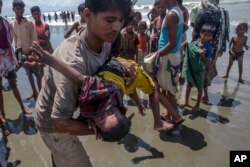U.N. and international agencies report the mass exodus of Rohingya refugees fleeing violence in Myanmar appears unstoppable as nearly 400,000 have arrived in Bangladesh in the last three weeks.
Aid agencies are increasing assistance operations in response to the ever-worsening crisis. Chris Lom is the International Organization for Migration's senior communications officer. Lom says there is no sign the flow of desperate people arriving in Bangladesh from Myanmar will end soon.
Speaking by telephone from Cox’s Bazar, Lom says smoke from burning villages in Myanmar’s northern Rakhine state is still visible. He says thousands of people who have escaped are believed to be waiting for boats to ferry them to Cox’s Bazar.
He says many of the people on the move are heading toward a large new government area being set aside for the refugees, but, he adds about half of the 400,000 are living alongside the road, on wastelands or on hills in horrible conditions.
“They really have nothing. A lot of them are very exhausted," said Lom. "They are hungry. They are often traumatized because they have seen terrible things on the other side of the border and most importantly, they have no access to things like clean water. So, people are going to get very sick, very quickly.”
The U.N. Children’s Fund reports youngsters account for 240,000 of the Rakhine refugees. To try to head off the spread of killer diseases, UNICEF and the World Health Organization are starting a vaccine campaign against measles and polio on Saturday.
The agencies hope to vaccinate about 150,000 children between the ages of six months and 15 years. The campaign will include deworming and provide vitamin A supplements, which prevent blindness in children with measles.









